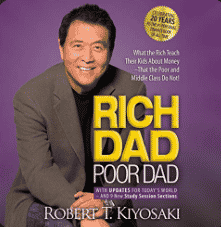
Rich Dad Poor Dad offers an interesting premise. The author, Robert Kiyosaki, compares and contrasts the advice he received from two influential people in his childhood. One represents his “rich” dad, and the other his “poor” dad.
Throughout the book, you’ll find straightforward advice to help you understand the basics of money management. Although the book doesn’t dive into the nitty gritty of managing your money, it sets up a framework that may transform the way you perceive the notion of wealth and your finances.
The Psychology Of Money: Harness Your Financial Emotions
Want to learn more about how you mentally connect to your finances?
Check out our book review for The Psychology of Money: Harness Your Financial Emotions.
What’s Rich Dad Poor Dad About?
Rich Dad Poor Dad is structured as several lessons to serve as a roadmap to financial literacy. In most chapters, you’ll find examples of how Kiyosaki put the lessons to work in his own life. Towards the end of the book, you’ll find practical advice to put the lessons you’ve learned into practice.
Kiyosaki’s style is approachable. He breaks down money myths that you might hold dear to illuminate a better path. If you start reading with an open mind, the book is a great way to learn about the building blocks of financial stability.
Let’s take a closer look at what each chapter covers.
The Rich Don’t Work For Money
The first chapter kicks off with Kiyosaki’s original relationship with money and how he started learning a different way of thinking.
A big lesson emphasized throughout the chapter is understanding how you acquire money and why that matters. Kiyosaki believes those who “put their money to work” consistently are likely to end up rich. It’s a big shift from the traditional employee mentality.
Why Teach Financial Literacy?
You can’t build wealth without a solid foundation of financial literacy. But as Kiyosaki points out, financial literacy is rarely taught in schools. So, it’s up to you to build your own financial literacy—and Rich Dad Poor Dad is a great start! Kiyosaki dives into the basics of personal finance, starting with a look at assets and liabilities. Simple definitions and clear graphics illuminate how wealth is built.
Kiyosaki breaks down the cash flow of different households. If you want to build wealth, you’ll want to mimic the rich’s strategies. But he also shows how confusion between assets and liabilities leads to a struggle for the middle class.
These basic principles can set you up for smart money management.
Mind Your Own Business
When Kiyosaki speaks about “minding your business,” an encouragement to build your asset column. Although prioritizing asset growth can be a challenge, it will pay off in the long run.
He offers some examples of potential assets to buy, plus, he shares rewards he’s earned by prioritizing assets in his own life.
The History Of Taxes And The Power Of Corporations
Taxes—it’s an unavoidable part of life, and Kiyosaki offers an interesting perspective on the brief history of income taxes.
Kiyosaki advises working smarter instead of harder when it comes to paying taxes. A big part of the chapter is devoted to explaining corporations and how this legal structure can significantly change your financial situation for the better.
He also gives a peek into how he built his own asset column through working hard as an employee. You’ll find many nuggets of wisdom tucked into this chapter.
The Rich Invent Money
Kiyosaki recommends expanding your horizons to look for income opportunities outside of your job. Instead of sticking with the normal strategy of saving and borrowing, look for opportunities to grow your funds through smart investing.
This chapter explores examples of how Kiyosaki has found good investment opportunities. The examples are encouraging. Plus, they can get the wheels turning in your mind.
Work To Learn, Don’t Work For Money
A lesson echoed in this chapter is the danger of over-specialization. With just one finely tuned skill, you are more vulnerable to unexpected career changes due to market conditions. But with a variety of skills, you can take charge of your earning potential.
Kiyosaki shares contrasting opinions between his rich dad and poor dad and you’ll find advice on what skills he thinks are most vital.
Overcoming Obstacles
Even with a solid base of financial literacy, common roadblocks stand between you and financial independence. Kiyosaki walks through the most common obstacles and offers advice on how to move past them.
The wisdom includes tips on overcoming everything from guilt to fear.
Getting Started
Putting the advice from the book into action is often easier said than done. If you need help pushing forward, you’ll find 10 action items to rally you into action.
The steps are simple, which can help you move forward with confidence. As you tackle these tips, Kiyosaki’s advice should propel you on your journey to financial success.
A Few To Dos
The final chapter gives extra advice to help you on your journey. With an open mind, these last tips could be the spark that ignites you into action.
Kiyosaki ties up the book with parting thoughts that reiterate critical parts of financial literacy. As with the rest of the book, you’ll find the pages filled with real-life stories that make lofty financial goals feel attainable and realistic.

About Robert Kiyosaki
Robert Kiyosaki is an entrepreneur and investor who wrote Rich Dad Poor Dad in 1997. Since then, the book has become an international bestseller. Now considered a classic in the world of financial literacy and personal finance, it also served as the foundation for several more books Kiyosaki published over the years.
Who Should Read Rich Dad Poor Dad?
Rich Dad Poor Dad is a foundational book that focuses on a money framework. Instead of learning about tactical strategies to improve your finances, it focuses more on how to reinvent your relationship with money and open your mind to a new way regarding the way you think about money. The book can help you learn how to define a true asset and build your investments to support complete, financial freedom.
Even if you have a solid grasp on budgeting, the mindset shift you may attain from reading Rich Dad Poor Dad could change your financial future. Even if you already have a firm understanding of what it takes to build financial freedom, this book is still a great read and serves as a motivating refresher.
Final Thoughts
Overall, Kiyosaki offers a solid financial framework. If you can look at the world through this lens, you likely won’t waste money on liabilities disguised as assets.
Some of the ideas are great in theory, so it’s best to take some of the lessons with a grain of salt. In practice, you might run into trouble. For example, a lot of the book focuses on becoming wealthy and by his definition, describes a fancy sports car in one of the anecdotes. A sports car isn’t everyone’s definition of what being rich means. Therefore, decide on your definition of what you consider “rich.”
The book has a total of 336 pages, and it’s available in dozens of languages. Each chapter offers worthwhile advice. So, if you are looking for a place to start building your financial literacy skills, this book will help.
Rich Dad Poor Dad By Robert Kiyosaki
Summary
Rich Dad Poor Dad is a classic personal finance read that will change the way you think about your relationship with money and your future.

Sarah Sharkey is a personal finance writer covering banking, insurance, credit cards, mortgages and student loans. She has written for numerous finance publications, including MagnifyMoney, Business Insider and ChooseFI. Her blog, Adventurous Adulting, helps young adults get a handle on their finances.
Editor: Claire Tak Reviewed by: Robert Farrington
